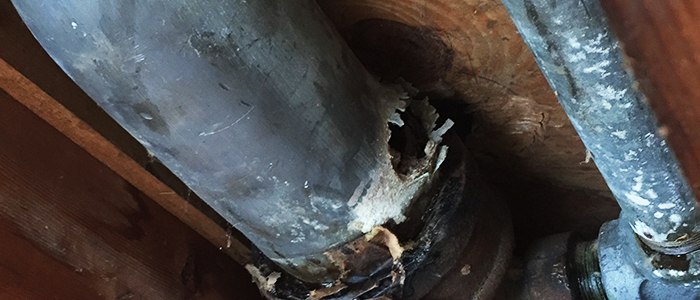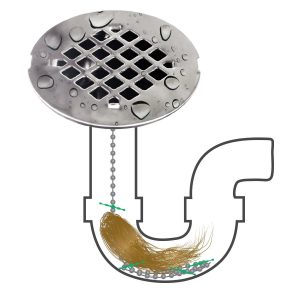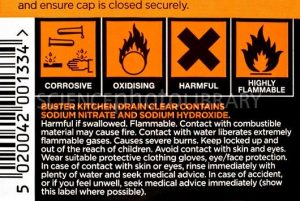The Dangers Of Using A Chemical Drain Cleaner

When experiencing a slow drain, or some sort of household drain clog, it is extremely common for homeowners to immediately grab their big-box-store DIY drain cleaner; chemical drain opener. The reason why this is many homeowners’ “go-to” is because, it’s easy, it’s cheap, it’s quick, and to the untrained eye it seems to solve the problem. However, what you may be unaware of, is that this common chemical drain cleaning solution, could actually be causing bigger problems to your plumbing.
Clogged drains are one of the most common indoor plumbing problems. Before we discuss how chemical drain cleaner works. Let’s look at some common causes of drain clogs:
 Hair buildup
Hair buildup- Soap scum
- Dirt buildup
- Washing foreign object down a drain
- Flushing non-waste in toilets
- Unapproved items in garbage disposal
- Accumulation of cooking oil or grease
- Too much toilet paper or wrong toilet paper
- Using non-water-soluble bath products
How a chemical drain cleaner works:
- These types of DIY clogged drain solutions are typically in the form of liquid, but also come in foam, gel, crystals, or powder forms.
- These products are designed to react with electrons in the blockage and this reaction generates heat and gas. This heat and gas reaction dissolves the clog, clearing your drain.
- Common (and strong) chemicals found in these products are, lye, caustic potash, peroxide, or bleach.
So, you may be asking yourself; “If my drain is cleared, what’s the issue?” Well, these chemical drain cleaners can actually be damaging to your plumbing, causing much bigger problems than a clogged drain. Here’s why:
 These harsh chemicals come with many warning labels in case of human contact, or ingesting, etc. So, similarly to how these chemicals could be fatal or severally damaging to your body and skin, they can also do the same to your pipes.
These harsh chemicals come with many warning labels in case of human contact, or ingesting, etc. So, similarly to how these chemicals could be fatal or severally damaging to your body and skin, they can also do the same to your pipes.- A chemical drain cleaner is not savvy enough to be able to decipher the difference between debris or buildup that is causing the blockage, and the actual guts of your plumbing system. So, it basically eats away at everything in its path, including your actual pipes.
- The longer these chemicals sit in your pipes, the more damage they will cause. So, if by some chance this strong chemical doesn’t unclog your drain, they will lay in your pipes, slowly eating away at your plumbing structure.
- Older pipes, especially those made of PVC, are extremely susceptible to damages caused by these chemicals.
Some things to consider when you notice slow draining, or a backed-up drain:
- What’s the source of the clog? Is it just a simple debris buildup, or is it a bigger issue like a broken pipe, a sewer line problem, a septic issue, etc. It’s important to understand that not only can these DIY drain cleaner remedies involving harsh chemicals be dangerous to you and your plumbing system, but they also may just mask a larger problem.
- Some other and less harsh DIY drain cleaning solutions to consider first are, plunging, pipe snakes, and home remedies like baking soda and vinegar mixtures.
The safest route when dealing with something as important as your home’s plumbing is to call the professionals. However, we understand the desire to try to fix what you believe to be a simple clog yourself first. So, make sure to try less harsh DIY solutions first, and if they aren’t doing the trick, understand that at that point it is best to call the professionals!
Plumbing is very intricate, and a really important element of your home’s basic functionality. If it is not working properly, or there are plumbing issues, this could not only be frustrating, but it could lead to devastating damages. Contact Kulk’s Plumbing & Heating for your free estimate and receive a quick, professional, and safe clogged drain solution! We can find the route of the problem, and remedy it correctly, and safely. We offer emergency plumbing services 24.7 – so we are available when you need us, and when and if disaster strikes.

